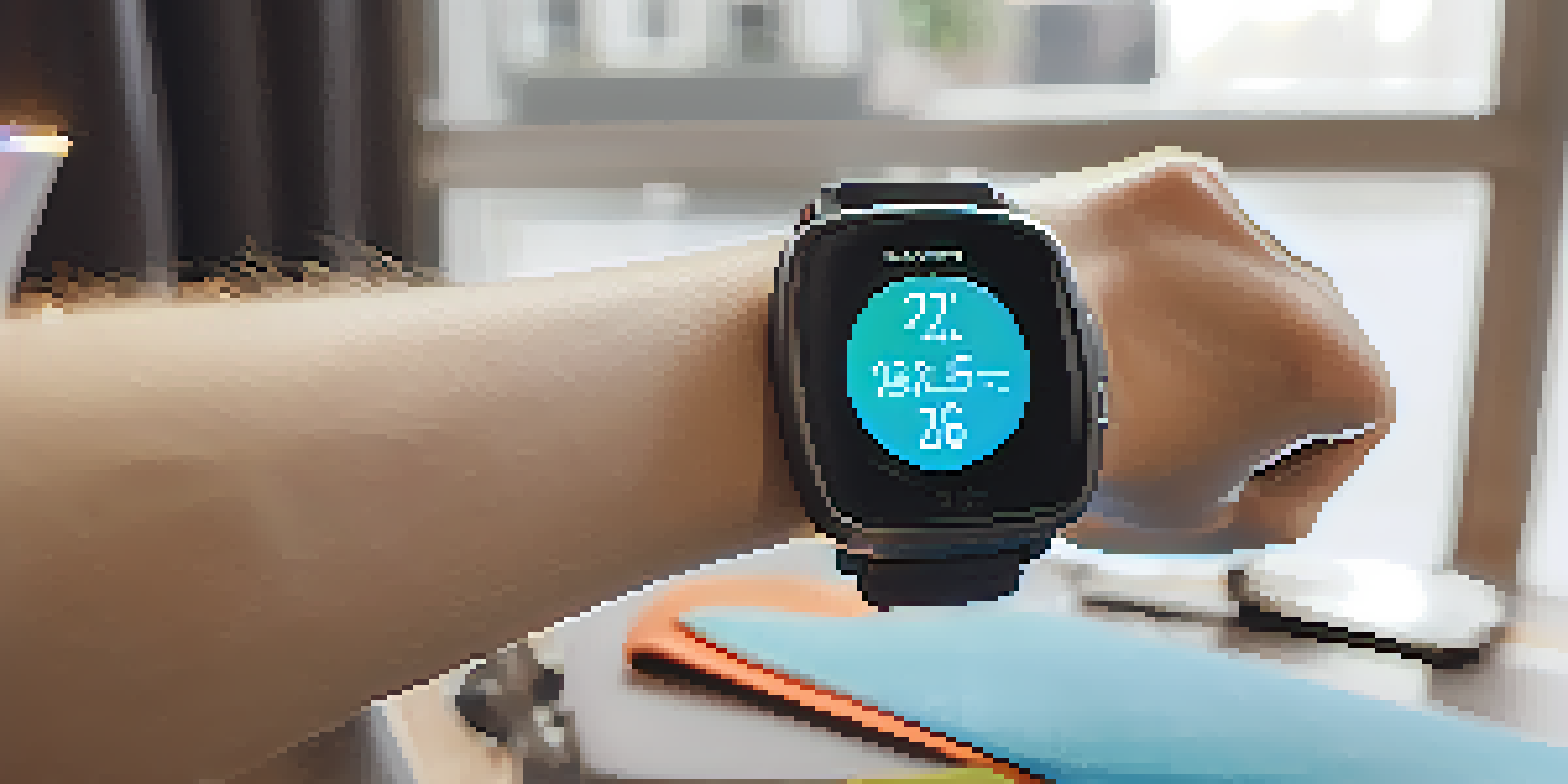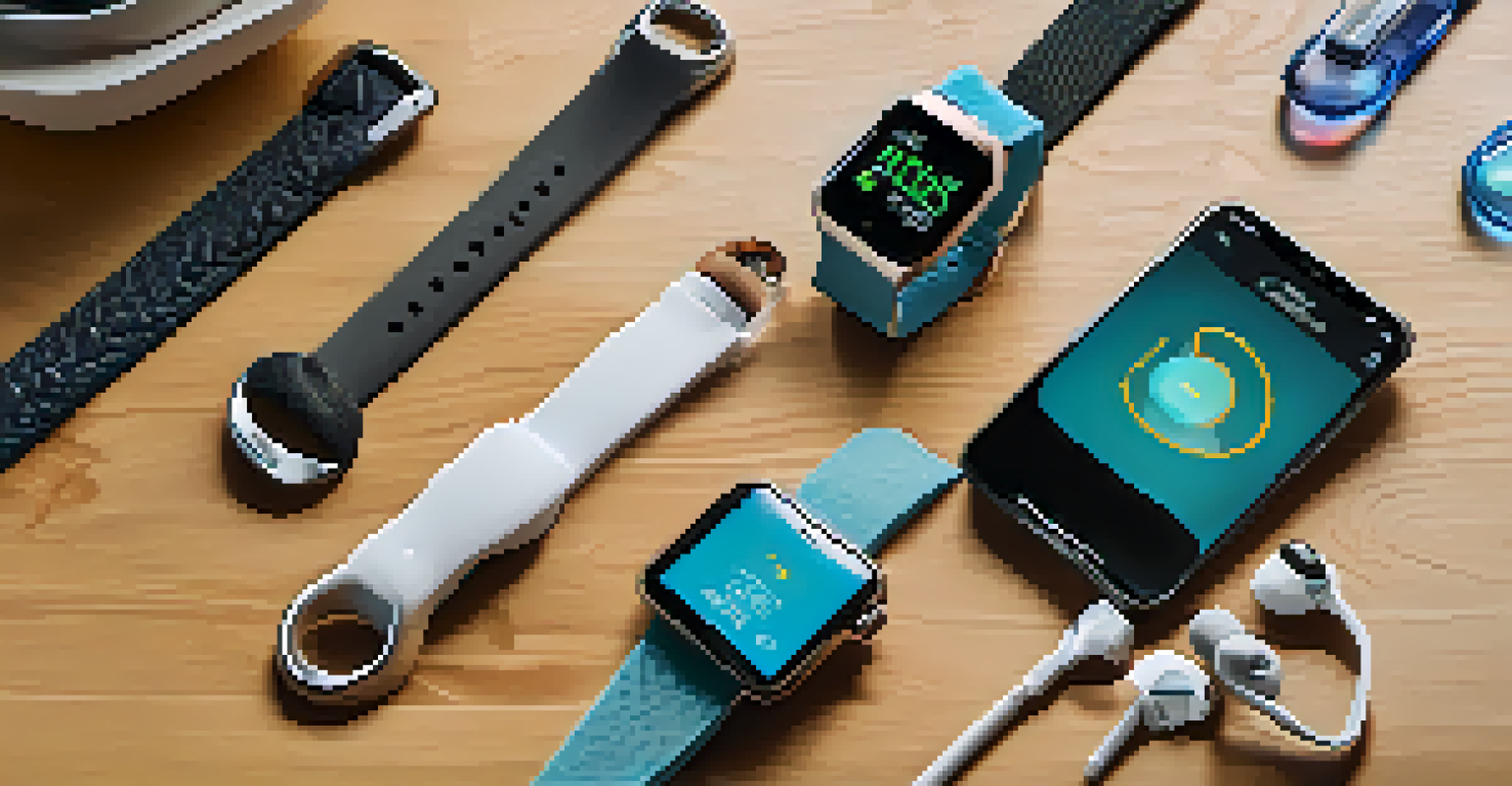Wearable Technology: Tracking Health for Better Living

An Introduction to Wearable Technology in Health
Wearable technology has revolutionized the way we monitor our health. From fitness trackers to smartwatches, these gadgets have made it easier for us to keep tabs on our well-being. With sensors that track everything from heart rate to sleep patterns, wearables provide real-time feedback that can encourage healthier habits and lifestyles.
Wearable technology is not just a trend; it is a revolution in how we approach our health and wellness.
Imagine having a personal health assistant on your wrist that nudges you to move when you've been sitting too long or reminds you to breathe when stress levels spike. This capability isn’t just about convenience; it’s about empowering individuals to take charge of their health in a proactive way. In essence, wearable tech offers insights that were once only available through medical consultations.
As we delve deeper into the world of wearables, we’ll explore how they contribute to better living, their benefits, and the future of health technology. Together, we can uncover the ways these devices are transforming our approach to health and wellness.
How Wearables Track Health Metrics
Wearable devices utilize a variety of sensors to track key health metrics. From heart rate monitors to pedometers, these tools collect data that can be invaluable for understanding our bodies. For instance, tracking your heart rate during exercise can help you gauge your fitness levels and optimize your workouts for better results.

Additionally, many wearables monitor sleep patterns, offering insights into your nightly rest. Poor sleep can impact everything from mood to physical health, so having a clearer picture of your sleep quality can motivate changes in your routine. Imagine waking up well-rested and ready to tackle the day, all thanks to insights gained from your wearable.
Empowerment Through Health Insights
Wearable technology provides real-time health data, empowering individuals to take proactive control of their well-being.
Moreover, some advanced wearables can even monitor oxygen levels and stress responses. By providing a comprehensive view of your health, these devices allow for more informed decisions, helping you live a healthier, more balanced life.
The Benefits of Tracking Health with Wearables
Tracking health with wearables offers numerous benefits that go beyond mere data collection. One major advantage is the ability to set and achieve personalized health goals. Whether you want to lose weight, improve cardiovascular fitness, or simply stay active, wearables can help you stay accountable and motivated.
The future of wearable technology will be about creating a seamless connection between the digital and physical aspects of health.
Moreover, the data collected can lead to better health management. For example, if a user consistently notices an elevated heart rate, it can prompt a discussion with a healthcare provider. This proactive approach can catch potential health issues before they become serious problems, making wearables a valuable tool for preventative health care.
Additionally, wearables foster a sense of community and competition. Many devices allow users to connect with friends or join challenges, making the pursuit of health fun and engaging. This social aspect can help keep you committed to your health goals, turning what can be a solitary endeavor into a shared experience.
Wearables and Mental Health Monitoring
While physical health is often the focus of wearable technology, mental health is equally important and increasingly integrated into these devices. Many wearables now include features that track stress levels through heart rate variability or mindfulness reminders. This can help users become more aware of their mental state and take proactive steps to manage stress.
For instance, some devices offer guided breathing exercises or meditation reminders, promoting mental wellness alongside physical health. This holistic approach acknowledges that our mental and physical health are interconnected and emphasizes the importance of addressing both.
Holistic Health Monitoring
These devices not only track physical metrics but also integrate mental health features, highlighting the interconnectedness of overall wellness.
Furthermore, tracking mood patterns over time can provide insights into triggers and help users develop coping strategies. By utilizing wearable technology, individuals can gain a greater understanding of their mental health, ultimately leading to improved well-being.
The Future of Wearable Health Technology
As technology continues to evolve, the future of wearable health devices is bright and full of potential. Innovations such as advanced sensors and artificial intelligence are paving the way for even more sophisticated health monitoring. Imagine wearables that can predict potential health issues before they occur, giving users unprecedented control over their health.
Moreover, the integration of wearables with telehealth services could transform how we interact with healthcare providers. Real-time data from wearables could inform virtual consultations, allowing for more personalized and timely care. This synergy could enhance patient outcomes and streamline healthcare processes.
Additionally, as awareness of health and wellness grows, we can expect to see more diverse applications of wearable technology. From specialized devices for chronic conditions to wearables designed for specific demographics, the future will likely focus on inclusivity and accessibility in health monitoring.
Challenges and Considerations for Wearable Tech Users
While wearable technology offers many benefits, it’s essential to recognize the challenges that come with it. Privacy concerns are a significant issue; users must be cautious about the data collected and shared. It’s crucial to understand how your data is being used and to choose devices from reputable companies that prioritize user privacy.
Additionally, there can be a learning curve when it comes to effectively using these devices. Some users may find the technology overwhelming or may not know how to interpret the data provided. However, many manufacturers offer tutorials and resources to help users make the most of their devices.
Future Innovations in Wearables
The evolution of wearable technology promises advanced health monitoring solutions, enhancing personalized healthcare experiences.
Lastly, it's important to remember that wearables should complement, not replace, professional medical advice. While these devices can provide valuable insights, they shouldn’t be relied upon for diagnosing or treating health issues. Balancing technology with traditional healthcare practices is key to achieving optimal health.
Final Thoughts on Wearable Technology and Health
In conclusion, wearable technology is transforming how we approach health and wellness. By providing detailed insights into our physical and mental well-being, these devices empower us to make informed decisions. Whether you're a fitness enthusiast or someone looking to improve your overall health, wearables can offer valuable tools to support your journey.
As we look to the future, the potential for wearable technology only continues to grow. Innovations will likely lead to even more personalized and effective health monitoring solutions, making it easier for individuals to prioritize their health. Embracing this technology can lead to a healthier, happier life.

Ultimately, the key to harnessing the power of wearable technology lies in understanding how to use it effectively and responsibly. By integrating wearables into our daily lives, we can take meaningful steps towards improved health and well-being.